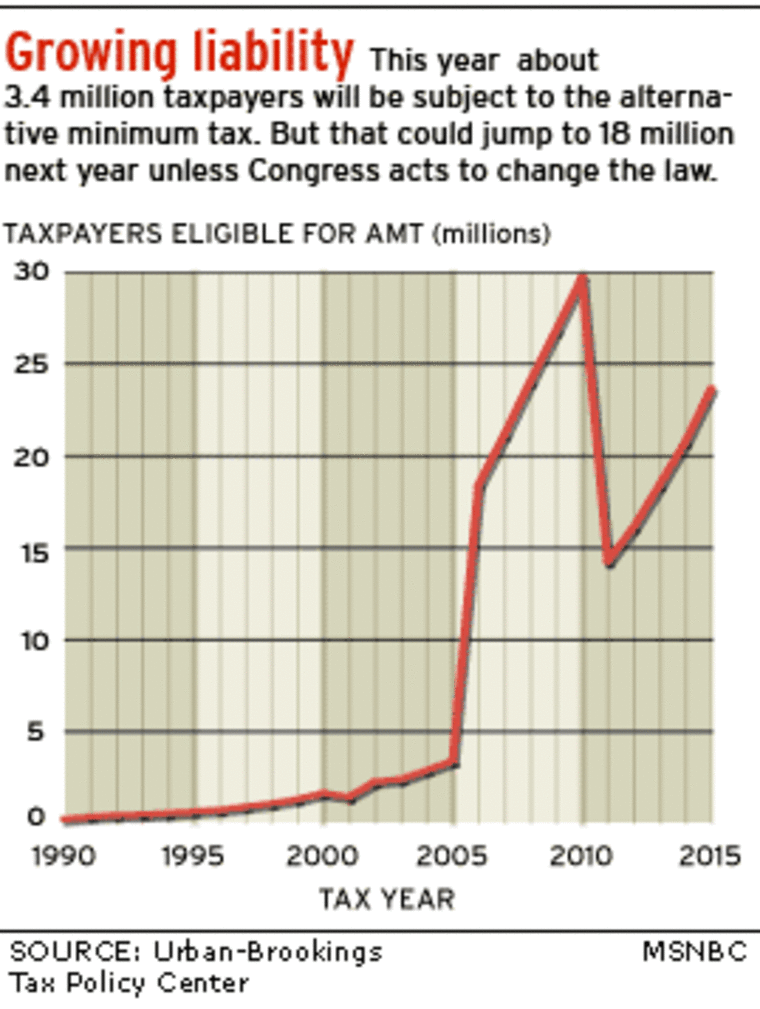It was intended to catch wealthy tax dodgers, but instead has crept closer to the middle class over the years. So a bipartisan group of senators wants to eliminate the alternative minimum tax even though it would deprive the government of billions of dollars in revenue.
Four senators — two Republicans and two Democrats, including leaders of the Senate Finance Committee — planned to introduce a $611 billion bill this week that would repeal the tax. The committee scheduled a hearing Monday to examine the uncontrolled expansion of the tax.
“It’s become mainstream,” said the committee’s chairman, Sen. Charles Grassley, who said he paid an extra $75 this year due to the alternative minimum tax.
“If we do nothing, the situation will get worse. It’s a mess, and we need to clean it up for good,” said Grassley, R-Iowa.
Joining Grassley in the repeal effort are Sen. Jon Kyl, R-Ariz., and Democratic Sens. Max Baucus of Montana and Ron Wyden of Oregon. Baucus is the top Democrat on the Senate Finance Committee.
Growing reach
They object to the tax’s growing reach and the burden it puts on unsuspecting taxpayers — higher tax rates and fewer tax breaks. Those affected must calculate their taxes twice, under the regular tax system and then the alternative system, and pay the higher amount.
“The time and the bureaucratic water torture that this tax puts people through just seems to me to cry out for reform,” Wyden said.

Congress came up with the tax in 1969 after discovering that 155 wealthy individuals had paid not a penny in taxes. At the time, lawmakers estimated the tax would affect one in 500,000 taxpayers.
As a result of inflation, an increasing number of taxpayers are covered by the tax.
The Congressional Budget Office last year predicted that the tax could hit as many as one in five taxpayers in 2010, including virtually all married couples with incomes between $100,000 and $500,000.
The CBO also said the tax no longer fulfills its original mission to ensure that the wealthiest pay some tax.
In 2001, about 1,100 taxpayers with income greater that $500,000 paid tax because they become trapped in the alternative minimum tax. But almost 900 other taxpayers with income in the same range avoided tax, despite the tax.
The several million taxpayers expected to get caught by the tax this year typically will not be wealthy people trying to evade paying their fair share of taxes. Instead, they more often have large families or live in high-tax states or take large deductions for unreimbursed work expenses.
Those attributes help most taxpayers when they calculate their tax bills, but they count against families when it comes to the alternative minimum tax.
Baucus called it a tax that “no one in their right mind would devise.”
“It’s time for a major overhaul of the AMT before millions of American families, including many of Montana’s working families, wake up to a stealth tax increase,” he said.
The options for a major overhaul all come at a high price, particularly at a time of soaring budget deficits.
Lost revenue
The repeal bill would deprive the government of $611 billion over a decade, according to the Joint Committee on Taxation. It would eliminate the tax by year’s end.
Instead of repealing the tax, lawmakers could free many families from paying it by eliminating some of its unintended effects. Congress did not intend that families should pay the tax just because they had many children or lived in states with high property and income taxes.
The CBO estimated that one-fifth of taxpayers could be freed from the tax in 2010 if children were treated the same under the regular tax system and the alternative minimum tax. That change would cost about $175 billion over a decade.
If deductions for state and local taxes paid on income and property were similarly changed, about one-third of those projected to pay the tax in 2010 would be dropped from its rolls. That would cost about $360 billion over a decade.
Combining those two options would drop 18 million taxpayers from the tax in 2010 at a 10-year cost of $440 billion.
For the past several years, lawmakers have tried to stave off the tax’s worst effects with temporary patches that prevent more taxpayers from getting ensnared.
The Senate committee said extending that solution is costly, too. It would eat up $385 billion over a decade, or nearly 60 percent of the cost of repeal.